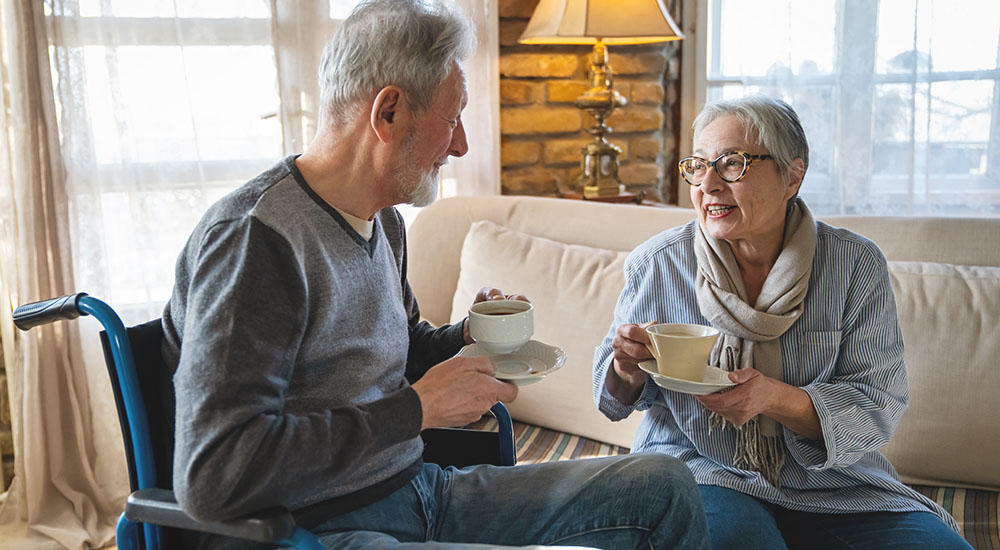
Hope Hospice chaplains come from diverse pastoral education and personal spiritual backgrounds. This variety equips the team in assisting people from all walks of life. Some patients have specific religious affiliations or spiritual practices. Others have no faith traditions. For the latter, a chaplain can still provide deeply meaningful support during the hospice journey. A simple listening ear or quiet presence at the bedside can help a person find peace. Chaplains don’t try to convert people to a specific path. We witness and honor the path that people find on their own.
A chaplain also can engage with a patient to conduct a life review, which is a process that can be beneficial to anyone, regardless of their faith tradition or lack thereof. A life review is the practice of reflecting on one’s life. The chaplain may ask questions, but it’s the patient who drives the conversation. The person is encouraged to consider both highs and lows, achievements in their personal and professional circles, and memories connected to major milestones.
In what ways does a life review benefit a person at the end of life? To start, it helps a person consider the influence they had on the world. Sometimes it takes active conversation about these topics to fully consider one’s impact on others. Some realizations will be positive, while others may reveal regret. If the person is willing, diving deeper into these regrets to consider their origins and the individual’s role can help a person find resolution. This is the work of forgiveness. At the end of life, the strongest spiritual pain comes from forgiveness issues.
Life review is a standard practice for most of us who counsel patients. Some want a straightforward journey through the memories of their lives. A patient I worked with wanted to leave a journal about his life for his family to read after he was gone. He wanted to share his wisdom and experiences, but his progressive disability prevented him from continuing to type his history on the computer. I suggested he use a tape recorder and speak his memories to be transcribed or listened to by his family. He was very happy to do this, and often during my visits I helped him to turn on the recorder, position it, and listen to him as he shared his stories.
I worked with a man who identified as an atheist. He revealed many ways he had been hurt. The man had lost his six-year-old son as well as his wife. He was a Viet Nam War veteran and had seen many horrible things overseas. The man felt that if God existed, he wouldn’t have allowed such things to happen.
He shared a story about witnessing BB King play at the historic Grace Cathedral in San Francisco, where, he says, “I felt something.” Then he said he was going to be buried with his small son. “Maybe we will see each other again,” he reflected. He said that it was okay if their bodies transmuted into the flowers and grass and were together in that way, if that is all there was. This was a highly spiritual moment for him, even though he claimed no connection to a higher power. When I hear BB King, I remember this patient.
Another man I worked with was a Christian and he was very angry at God. He blamed God for all the ills of the world, including his own misfortunes. While on hospice, this patient allowed chaplain visits but only to complain about how God was the one who caused every problem. He talked about living from one terrible experience to another. I listened and honored his memories. He was in terrible physical pain while he was transitioning. He felt abandoned and needed a reminder that he was still known. I leaned down and spoke close to his ear. I told him I was sorry for all the pain in his life. I told him God had witnessed his pain. I told him that he was loved, that God was with him, and he would welcome him and would honor him for his pain. I reminded him that he could speak to God silently, in his head, and God would hear. The man finally calmed and died peacefully.
I worked with another man who had no family, though he had a good friend. The love of this man’s life died years ago, and he shared with me his memories of how happy they were. He was in his 80s, though they had only shared seven years together. They were a gay couple and had endured some challenges in a culture that didn’t unanimously accept them. But the man focused on the love and happy memories with his partner, and on the support from his friend. This patient was an artist, so we often talked about his memories of creating beautiful things. His memories reflected his inner peace and spirituality. He believed his spirit would be reunited with his deceased loved one, so he was peaceful and accepting of his death. He had forgiven anyone who had hurt him and moved on.
People tell their stories, and as chaplains we witness. We honor their journey and provide the spiritual space for them to find meaning in the way their own spirit needs.
You might also like:
The Art of Forgiveness
Why You Should Start Hospice Sooner Than Later